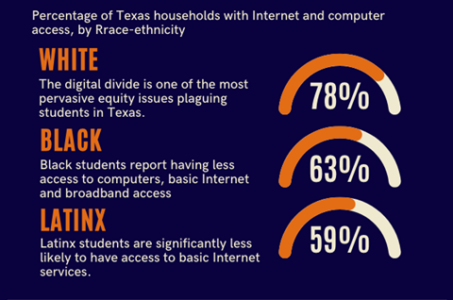• By Michelle Martínez Vega & Christina Quintanilla-Muñoz, M.Ed. • IDRA Newsletter • October 2023 •
In an era characterized by rapid technological advancements, it is imperative that we, as educators and stewards of our educational institutions, reflect upon our commitment to providing the best possible future for our children.
In the spring of 2020, the Texas Education Agency (TEA) reported that more than 600,000 Texas public school students could not be reached by school communications during the COVID-19 pandemic. Consequently, schools lost touch with one in 10 students during the transition from in-person to remote learning (Marshall & Quintanilla-Muñoz, 2021).
In January 2021, TEA reported that only half of Texas’ 5.3 million students were engaging in remote learning as of October 2020 (2021), prompting the state’s urgent need to supply over 2.5 million computer devices to Texas students during the pandemic through Operation Connectivity (TEA, 2020). But devices could not solve the pre-existing broadband access limitations. As a result, millions of students missed out on two to three years of instruction, with students of color disproportionately impacted (Swaby, 2020). Texas schools will feel the ramifications of this instruction loss for years to come.
Yes, the problem is that widespread. Because digital redlining exists, the digital divide exists. The homework gap is real – and not just related to the pandemic.
According to American Community Survey estimates by the U.S. Census Bureau, 87% of households in Texas had a broadband Internet subscription in 2020, meaning roughly 13% of the state’s population was without access to the digital economy (U.S. Census Bureau, 2020). Additionally, the American Immigration Council reported that over one in four people in Texas lack any access to broadband Internet (AIC, 2022). That is more than 7.6 million people.
Digital Equity is a 21st Century Necessity
At its core, digital equity recognizes that access to the Internet and technology is not a luxury but a necessity in the 21st century. Just as access to education, health care and employment opportunities are considered fundamental to a person’s well-being and success, so too is access to the Internet and digital skills training. Digital inclusion is not merely a matter of convenience; it is a matter of equity and social justice.
In today’s digital-centric world, access to the Internet is crucial for:
- Education: All students need the Internet, online learning, research, accessing educational resources, college exploration and applications, and financial aid opportunities.
- Employment: Job applications and remote work require digital skills and Internet access.
- Health Care: Telemedicine and digital health resources are critical for families.
- Social Connection: Internet access helps families stay connected with loved ones, particularly when physical distance is a barrier.
The Digital Divide Can be Bridged
Throughout our 50-year history, IDRA has championed digital inclusion, ensuring that students from all socioeconomic backgrounds have equitable access to the digital tools they need to successfully participate in an increasingly online learning environment.
During the 2021 Texas legislative session, IDRA’s digital equity research underscored the pervasiveness of the digital divide during the pandemic by focusing on three key areas: (1) the state of students’ access to affordable and reliable Internet and devices; (2) the impact of limited broadband access and digital skills support on classwork and homework during the abrupt pivot to remote learning; and (3) the need for a multi-faceted approach for addressing the homework gap that prioritized community assessment and solution-building.
Through IDRA’s multiple virtual community listening sessions with students, teachers, parents and community members during the pandemic, we bridged our digital equity policy strategy with community voice and insight. In our issue brief, Digital Destination – Texas Needs Broadband Connectivity for All Students & Families, IDRA underscored stories from these community forums about students’ reliance on reliable Internet access to be successful in school.
We urged the Texas legislature to take four key actions to address the digital divide (Marshall & Quintanilla-Muñoz, 2021).
- Invest in sustainable broadband infrastructure, prioritizing high-need Texas communities;
- Continue the distribution of reliable digital devices to students for their educational needs;
- Invest in digital skills training and support for educators, students and families; and
- Invest in robust community engagement programs, such as community-led digital equity studies and resources for strengthening school district’s capacity to assess student needs with respect to broadband access, digital technologies and digital skills training.
By engaging digital inclusion champions, community advocates, and students and their families in critical dialogues to confront these inequities in digital access, IDRA facilitated the development of sustainable, community-responsive solutions for bridging the digital divide in Texas.
IDRA published a Digital Equity – Online Technical Assistance Toolkit to introduce community stakeholders to the conversation around digital equity and assist school leaders in making informed decisions about increasing students’ access to broadband Internet, computer technologies, and the digital skills training necessary for supporting their educational success (IDRA, 2022).
IDRA’s critical advocacy ensured urban school districts were included in House Bill 5 (87 R), the state’s flagship broadband bill passed in 2021 that had key provisions for a statewide broadband office, statewide broadband plan, and grant program for schools and other entities to apply for federal broadband dollars (Marshall, 2021).
Through our engagement with federal, state and local decisionmakers, community leaders, and student advocates, IDRA emphasized the significance of digital technologies through actionable research, grassroots community activation, and policy advocacy. While the road to bridging the digital divide is an ever-evolving challenge, IDRA continues to root our digital inclusion research and advocacy in collective community efforts aimed at dismantling existing barriers to achieving digital equity for all our diverse communities. 
With support earlier this year from Rural LISC, IDRA’s LevelUp: RGV project crafted an innovative public-private partnership to provide experiential learning opportunities and paid apprenticeships to students in the Texas Rio Grande Valley. Working with community, technology and workforce partners, we are setting the stage to launch a school-based program to equip students and strengthen infrastructure in the region.
As we reflect on our organization’s history during this milestone anniversary year, IDRA remains committed to overcoming the evolving challenges related to navigating our digital world, ensuring future generations of students are primed to harness the full potential of digital technologies and information, with the skills necessary to advancing their learning.
Resources
AIC. (December 2022). Examining Gaps in Digital Inclusion in Texas. American Immigration Council.
IDRA. (2022). Digital Equity – Online Technical Assistance Toolkit.
Marshall, T. (June-July 2021). Texas Legislature Takes Some Steps Toward Addressing the Digital Divide, IDRA Newsletter.
Marshall, T., & Quintanilla-Muñoz, C. (2021). Digital Destination – Texas Needs Broadband Connectivity for All Students & Families, IDRA Issue Brief.
Swaby, A. (November 20, 2020). Many Texas families say remote learning isn’t working and they want it fixed. Texas Tribune.
TEA. (2020). State of Texas Transition to Online Assessments Feasibility Study. Texas Education Agency.
TEA. (June 2021). Enrollment in Texas Public Schools 2020-21. Texas Education Agency.
U.S. Census Bureau. (April 2020). Decennial Census 2020. U.S. Department of Commerce.
Michelle Martínez Vega is IDRA’s chief technology strategist. Comments and questions may be directed to her via email at michelle.vega@idra.org. Christina Quintanilla-Muñoz, M.Ed., is an IDRA research analyst. Comments and questions may be directed to her via email at christina.munoz@idra.org.
[©2023, IDRA. This article originally appeared in the October 2023 edition of the IDRA Newsletter by the Intercultural Development Research Association. Permission to reproduce this article is granted provided the article is reprinted in its entirety and proper credit is given to IDRA and the author.]


